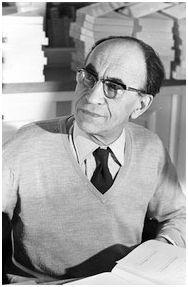This article includes a list of general references, but it lacks sufficient corresponding inline citations. (February 2021) |
Louis Charles Jean Dumont (11 August 1911 – 19 November 1998)[1] was a French anthropologist.
Louis Dumont | |
|---|---|
 | |
| Born | 11 August 1911 |
| Died | 19 November 1998 (aged 87) |
| Nationality | French |
| Citizenship | France |
| Employer(s) | Oxford University, École des Hautes Études en Sciences Sociales |
| Notable work | Homo Hierarchicus |
| Spouse | Suzanne Tardieu |
Dumont was born in Thessaloniki, in the Salonica Vilayet of the Ottoman Empire. He taught at Oxford University during the 1950s, and was then director of the École des Hautes Études en Sciences Sociales (EHESS) in Paris. A specialist on the cultures and societies of India, Dumont also studied western social philosophy and ideologies.
Works
editHis works include Homo Hierarchicus: Essai sur le système des castes (1966), From Mandeville to Marx: The Genesis and Triumph of Economic Ideology (1977) and Essais sur l'individualisme: Une perspective anthropologique sur l'idéologie moderne (1983), in which he contrasts holism with individualism.
See also
editReferences
edit- ^ "MatchID".
- ^ Allen, N. J. (1998). "Obituary: Louis Dumont (1911-1998)" (PDF). Journal of the Anthropological Society of Oxford. XXIX (1): 1–4.[permanent dead link]
External links
edit- Good, Anthony (5 December 1998). "Obituary: Professor Louis Dumont". The Independent. Retrieved 25 September 2012.
- Beteille, Andre (9 January 1999). "Obituary: Louis Dumont (1911-1998)" (PDF). Economic & Political Weekly.
- Celtel, André (December 2004). Categories of Self.Louis Dumont's Theory of the Individual. Berghahn Books, New York, Oxford.